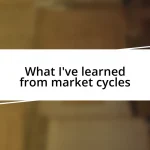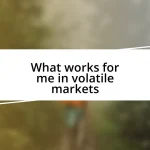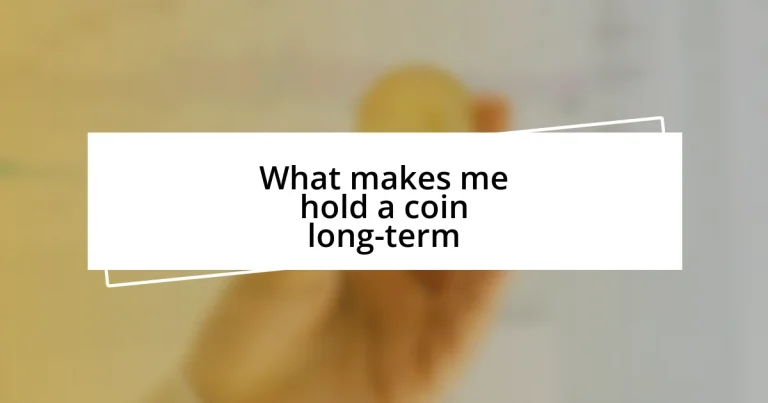Key takeaways:
- Long-term investing emphasizes patience, compounding growth, and resilience against market volatility.
- Diversification and strategies like stop-loss orders and dollar-cost averaging help minimize risk and enhance investment stability.
- Setting realistic investment goals aligned with personal timelines and regularly reassessing them ensures adaptability in a volatile market.
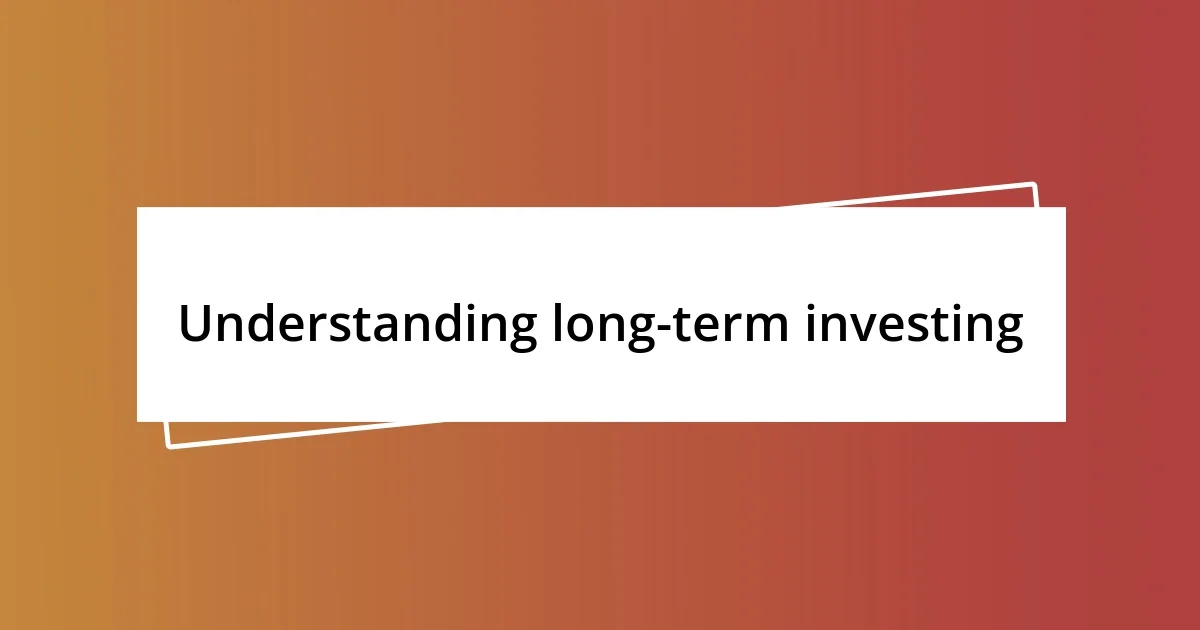
Understanding long-term investing
Long-term investing, to me, is about patience and understanding the potential for growth over time. I remember when I first started investing; I was anxious to see quick returns. However, I learned that the market rewards those who are willing to wait and weather the ups and downs. Have you ever considered how much time you might be saving if you don’t chase the next trend?
What captivates me about long-term investing is the power of compounding returns. I still reflect on that initial investment I made years ago; it seemed like a small step then, but watching it grow over the years has been incredibly rewarding. It’s fascinating to realize that time can be one of your greatest allies in building wealth. Wouldn’t it be exciting to see your investments flourish without constantly worrying?
When I think about risk in long-term investing, I recognize it as an inherent part of the journey, not a deterrent. I once faced a significant drop in the value of a stock I held, and my impulse was to sell. But my decision to hold on taught me the importance of staying focused on long-term goals rather than reacting to short-term volatility. Isn’t it interesting how resilience can transform our investing perspective?
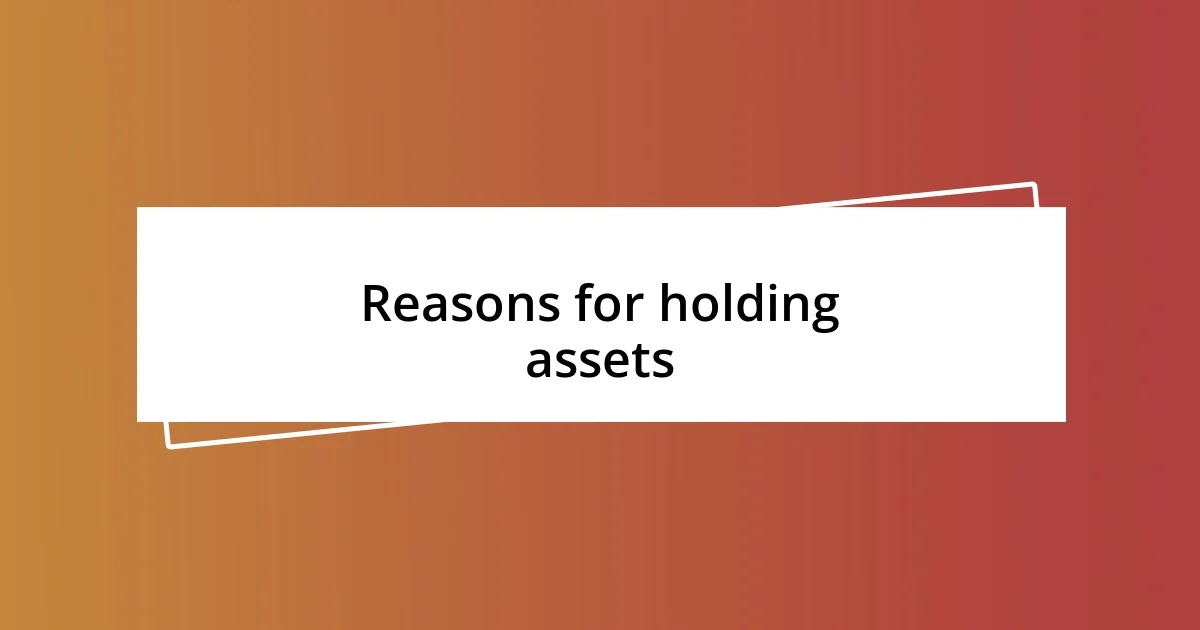
Reasons for holding assets
One of the primary reasons I hold assets long-term is the belief in their intrinsic value and the potential they hold for future growth. For example, I initially invested in a tech company that seemed risky, yet I saw its innovative approach as a window into the future. Over the years, I’ve often reminded myself that fleeting market trends can be deceiving. I can’t help but think about how staying the course with certain investments has paid off, especially when others were quick to sell.
Here are some key reasons for holding assets long-term:
- Compounding growth: Reinvested returns create more potential earnings.
- Emotional stability: Reduces stress from daily market fluctuations.
- Tax efficiency: Long-held assets often benefit from lower capital gains tax rates.
- Stronger conviction: I feel more confident in my choices when I believe in the underlying assets.
- Strategic patience: Allows me to wait for market revaluations and catalysts that can drive prices up.
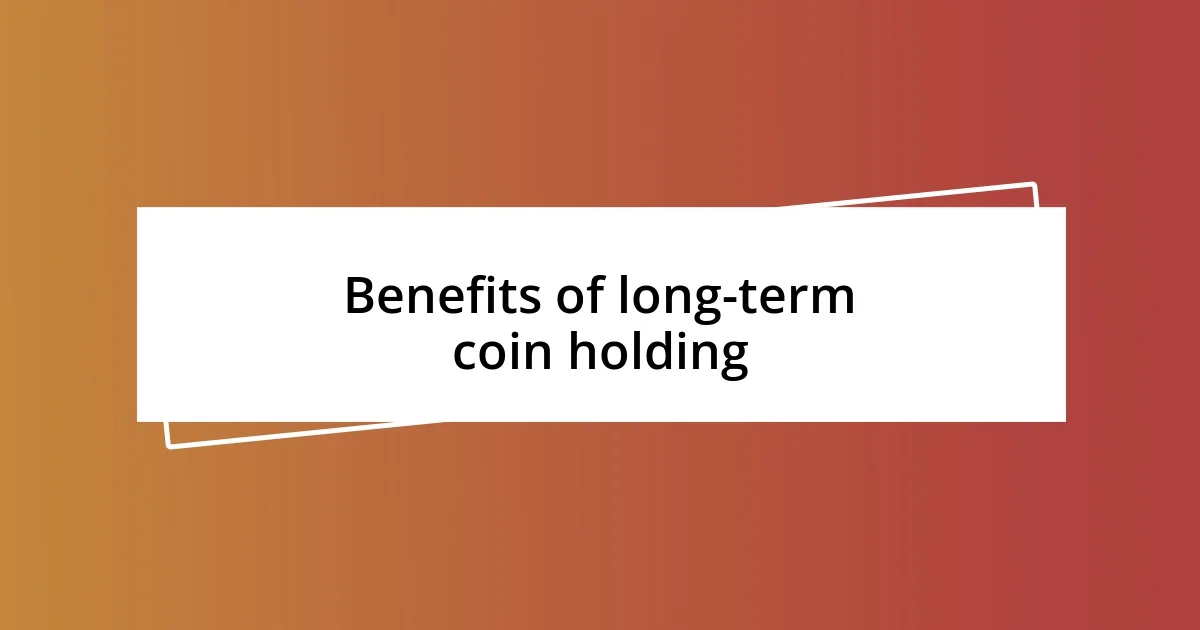
Benefits of long-term coin holding
The benefits of holding coins long-term often manifest in ways that go beyond financial gain. For instance, I find that the longer I hold an asset, the more my understanding of that coin deepens. This not only enhances my investment strategy but encourages a connection that makes me feel more secure about my choices. Have you ever considered how the knowledge you gain over years can bolster your confidence in the market?
Moreover, the reduced stress that comes with long-term holding can’t be overstated. I remember a time when market volatility had me on edge, anxious about every price fluctuation. However, as I shifted my focus to long-term prospects, I found a sense of calm. The constant worry over daily market movements slipped away, allowing me to make more strategic decisions. It’s transformational to realize that embracing a long-term view can lead to peace of mind while investing.
Finally, the tax benefits associated with long-term holdings are a huge motivator for me. Short-term trades can eat away at profits due to higher tax rates, while long-term investments typically enjoy a lower capital gains tax. I recall selling off some of my assets prematurely once and paying a hefty price because of that. Now, I prioritize holding onto my coins longer to maximize my earnings and minimize tax liabilities – a decision that has certainly paid off in the end.
| Benefit | Description |
|---|---|
| Compounding Growth | Reinvested returns enhance future earnings potential. |
| Reduced Stress | Long-term focus diminishes anxiety from daily market changes. |
| Tax Efficiency | Lower capital gains tax for long-held assets boosts overall returns. |
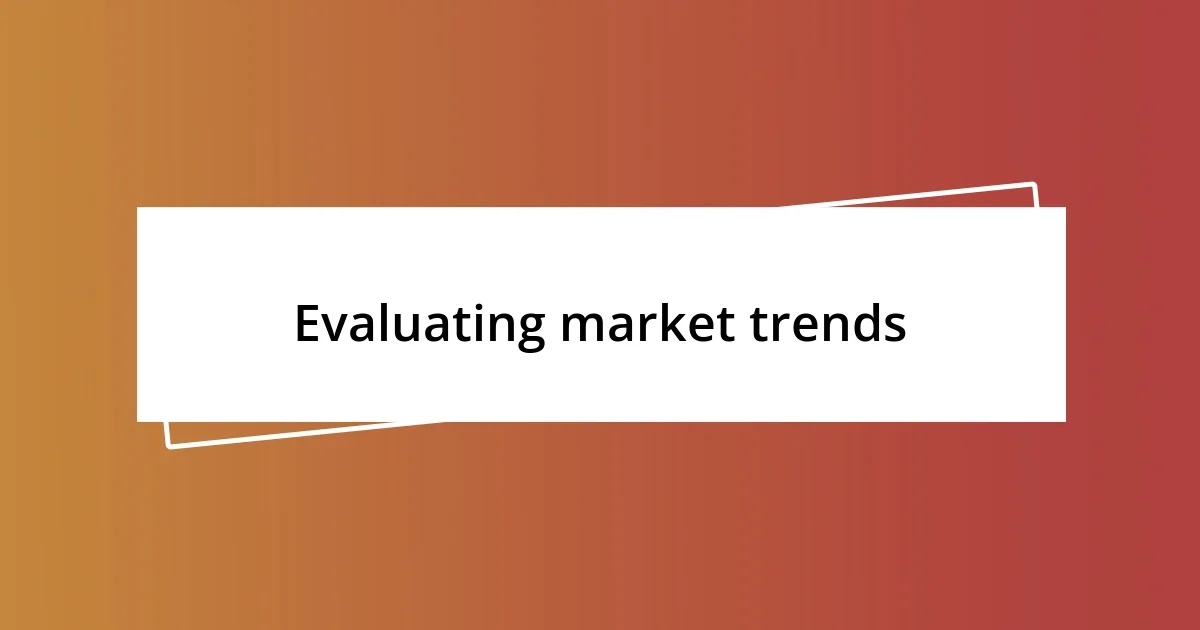
Evaluating market trends
Evaluating market trends is critical for deciding whether to hold onto a coin long-term. In my experience, I’ve found that understanding the broader market narrative greatly influences my investment choices. For instance, I tracked a specific crypto project during a bearish phase; instead of panicking, I delved into community discussions and market analysis. That helped me see the value beneath the surface, reinforcing my resolve to hold onto my assets.
I often reflect on how fluctuations can mask the underlying potential of an asset. There was a period when a coin I owned plummeted sharply, creating mounting fears among other investors. But I had researched its upcoming technological advancements and ecosystem developments. This knowledge allowed me to ride out the storm and emerge stronger on the other side, reaffirming my belief in the long-term growth narrative.
Moreover, I remind myself that historical data can offer invaluable insights. While past performance doesn’t guarantee future results, I study previous market cycles to identify patterns. Have you noticed how certain assets tend to bounce back after a downturn? I remember analyzing charts during market dips, and seeing how patience resulted in reliable gains for those who stayed committed. That’s when I realized that evaluating market trends isn’t just about numbers; it’s about understanding a story and believing in its potential.
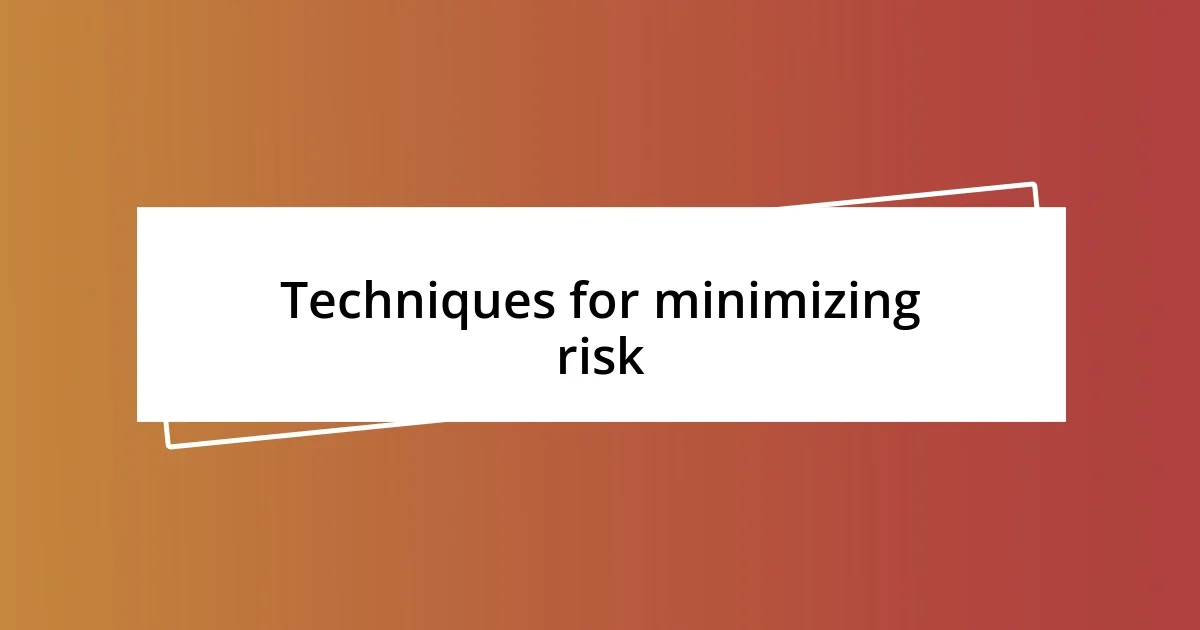
Techniques for minimizing risk
Techniques for minimizing risk are crucial in the world of long-term coin holding. One effective strategy I employ is diversification. By spreading my investments across various coins, I decrease the impact of any single asset’s downturn. This approach reminds me of how a well-balanced diet supports overall health; similarly, a diversified portfolio protects against the unpredictable nature of the market. Have you ever thought about how one bad choice can take down an entire investment plan?
Another method I find helpful is setting stop-loss orders. These are predefined points where I decide to sell an asset if it drops to a certain level, which helps cap losses. I recall a time when I didn’t set a stop-loss, and a sudden market crash left me nursing a significant loss that took months to recover. Now, whenever I initiate a new trade, I automatically adjust my stop-loss level to ensure I can walk away with a smaller hit if things go south. It’s like wearing a seatbelt—you don’t want to need it, but it brings peace of mind knowing it’s there.
Additionally, I often utilize dollar-cost averaging (DCA) in my investment strategy. This technique involves investing a fixed amount of money into a particular coin at regular intervals, regardless of its price. I find that this not only lessens the emotional burden of trying to time the market but also helps me buy more coins when prices are low. I vividly remember when Bitcoin was fluctuating wildly; rather than fearing the volatility, I kept investing on a schedule, and it felt like planting seeds for future growth. Isn’t it reassuring to know that slow and steady can indeed win the race?
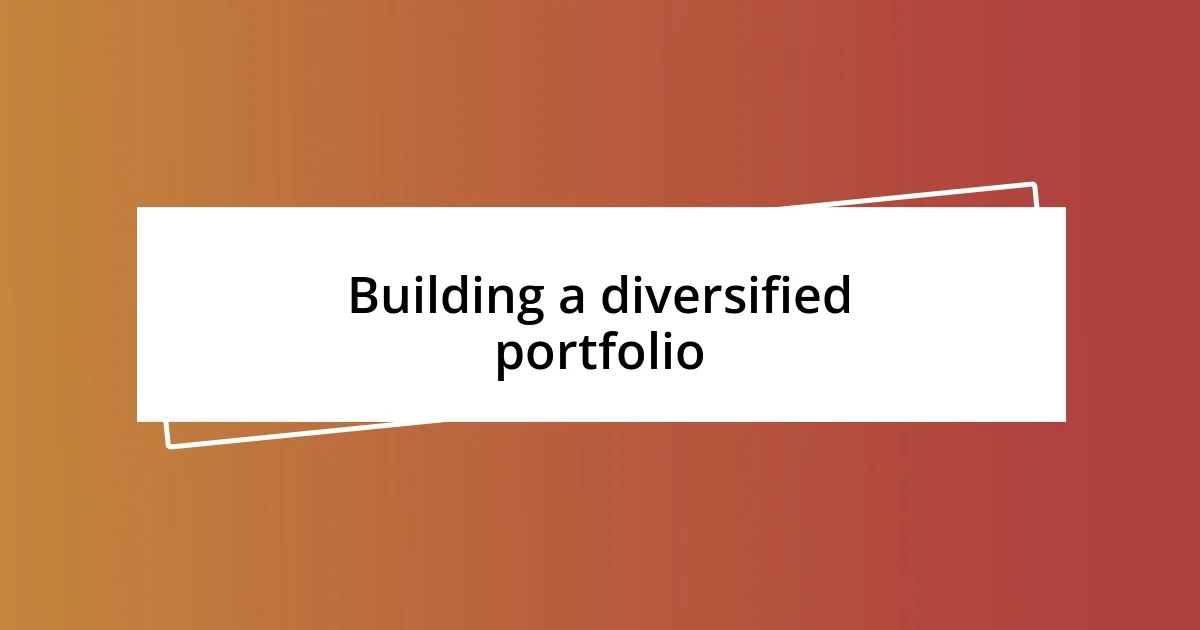
Building a diversified portfolio
Building a diversified portfolio has been a game-changer for me in my investment journey. I still remember my early days, when I put all my eggs in one basket—oh, what a mistake that was! After seeing one of my investments tank, I quickly learned the importance of spreading risk across different coins. It’s a bit like creating a playlist of your favorite songs; wouldn’t you agree that a mix keeps things lively and enjoyable rather than risking it all on just one track?
When I think about diversification, I also consider the different sectors within crypto. There are stablecoins, DeFi tokens, and even NFTs, each serving unique purposes. By investing in a variety of these sectors, I’m not only protecting my investments but also positioning myself to benefit from various growth opportunities. Have you ever seen how some projects can explode in value while others languish? Diversifying helps me capture those potential winners while mitigating losses from laggards.
I’ve found that setting clear allocation strategies can enhance my portfolio’s stability. For instance, I dedicate a percentage to high-risk assets and another to stable investments. This structured approach provides a solid foundation during market volatility. I recall feeling particularly anxious during a significant market dip, yet knowing exactly how my portfolio was structured calmed my nerves. It’s like having a financial roadmap—I knew where to go next, even when the path became rocky. Isn’t it comforting to have a plan in place that can guide you through turbulent times?

Setting realistic investment goals
Setting realistic investment goals is essential for navigating the volatile cryptocurrency landscape effectively. When I first started investing, I had lofty dreams of becoming a millionaire overnight. I soon realized that it’s vital to set attainable benchmarks instead. I now strive for modest, incremental gains based on my financial situation and market conditions, which helps me maintain a more balanced perspective. Do you ever find yourself getting carried away by ambitious aspirations?
I often remind myself to align my goals with a timeframe that suits my lifestyle. For instance, some of my investments are for long-term growth, while others are meant for shorter-term gains. Recently, I waited patiently for nearly two years for a specific altcoin to reach my target price, and the satisfaction was well worth the wait. Using a clear timeframe keeps me grounded and focused—like having a personal coach cheering me on from the sidelines.
Another important aspect is regularly reviewing and adjusting these goals. Life and market dynamics can change rapidly, so I’ve learned to reassess my objectives every few months. I recall a time when I had to shift my focus from aggressive growth to capital preservation due to unexpected financial obligations. The experience taught me that flexibility is just as important as setting those initial goals. After all, isn’t it empowering to adapt your plan according to your evolving situation?










